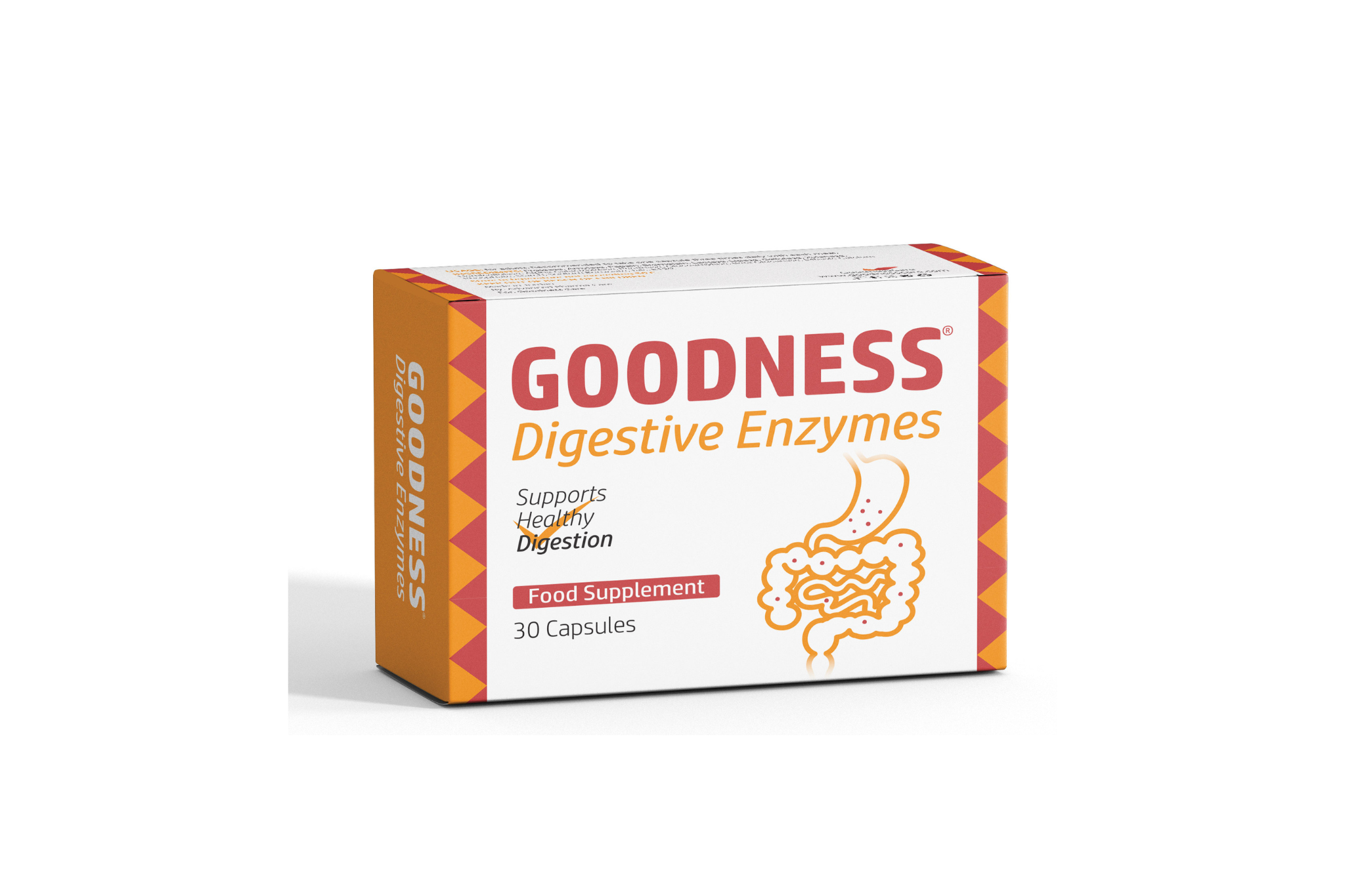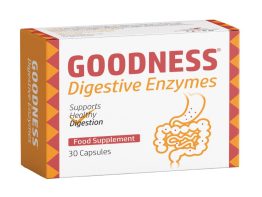A complete Digestive Solution – Power-Packed Enzymes to Support Every Aspect of Digestion
13 Powerful Digestive Enzymes to Support Healthy Digestion, Reduce IBS, Crohn’s, and Celiac Disease Symptoms, Supplement Pancreatic Enzymes, and Increase Nutrient Absorption.
1. Protease (Pepsin, Trypsin, and Chymotrypsin)
Protease enzymes break down proteins into amino acids that the body can absorb. These enzymes are essential for:
- Energy: Converts proteins into usable energy
- Muscle Health: Supports muscle repair, recovery, and growth
- Healing: Helps with blood clotting and removes damaged proteins
- Cell Health: Aids tissue repair and protein recycling for cell growth
2. Amylase – The Energy Unleasher
Amylase breaks down complex carbohydrates into simple sugars like glucose that the body can easily use for energy. This enzyme is vital for:
- Brain Function: Ensures steady glucose supply to the brain for memory, focus, and cognitive performance.
- Physical Energy: Converts carbs to fuel for muscles during exercise, supporting endurance and performance.
- Metabolic Health: Helps maintain stable blood sugar levels, reduce energy crashes, and support long-term health.
3. Lipase – The Fat Transformer
Lipase breaks down fats and oils into fatty acids and glycerol, making them usable by the body. This enzyme is crucial for:
- Nutrient Absorption: This enzyme enables the absorption of fat-soluble vitamins (A, D, E, K) and essential fatty acids through the intestines.
- Energy: Converts fats into long-term energy storage and sustained fuel for the body.
- Blood Lipids: Helps regulate triglycerides and cholesterol levels for heart health.
- Weight Management: Facilitates efficient fat digestion and metabolism.
- Digestion: Prevents digestive issues like bloating and gas by properly breaking down fats.
4. Bromelain – The Pineapple Powerhouse
Bromelain is a protein-digesting enzyme from pineapples that breaks down proteins while offering therapeutic benefits. This enzyme provides:
- Protein Digestion: Breaks down proteins for better absorption, supporting muscle recovery and growth
- Anti-inflammatory: Reduces swelling and pain, especially in conditions like arthritis
- Immune Support: Helps balance immune response and defense against pathogens
- Heart Health: Supports healthy blood flow and reduces risk of clotting
- Healing: Promotes wound healing and skin health through tissue repair
5. Papain – The Papaya’s Potent Enzyme
Papain is a protein-breaking enzyme from papaya that aids digestion and offers therapeutic benefits. This enzyme provides:
- Protein Digestion: Breaks down proteins from meat, fish, and dairy, preventing digestive discomfort
- Anti-inflammatory: Reduces inflammation and swelling, particularly helpful for arthritis
- Wound Healing: Removes dead tissue while preserving healthy tissue, speeding up healing
- Immune Health: Helps balance the immune system and may reduce allergic reactions
- Skin Care: Acts as a natural exfoliant to improve skin texture and appearance
6. Lactase – The Dairy Digestor
Lactase breaks down lactose (milk sugar) in dairy products. This enzyme is crucial for:
- Lactose Intolerance: Helps prevent digestive issues like cramps, bloating, and gas when consuming dairy
- Nutrition: Enables people to access important nutrients in dairy (calcium, vitamin D, protein) without discomfort
- Digestive Health: Supports proper digestion and maintains a healthy gut environment
- Lifestyle: Allows people to enjoy dairy products and maintain dietary freedom
- Customization: Available in various forms and doses to match individual needs
7. Glucoamylase – The Starch-to-Sugar Converter
Glucoamylase breaks down complex carbohydrates (starches) into glucose, making them usable by the body. This enzyme is essential for:
- Energy: Converts starches into readily available glucose for the brain, muscles, and metabolism.
- Digestion: Prevents gas and bloating by efficiently breaking down complex carbs.
- Nutrient Use: Helps the body absorb glucose and other nutrients effectively.
- Blood Sugar: Supports steady glucose levels, avoiding energy spikes and crashes.
- Carb Processing: Enables efficient digestion of starchy foods like bread, rice, and potatoes.
8. Cellulase- The Plant Fiber Specialist
Cellulase breaks down cellulose (plant fiber) that the human body can’t digest independently. This enzyme is vital for:
- Plant Nutrition: Unlocks nutrients trapped in plant cell walls and converts cellulose into usable glucose.
- Detoxification: Supports regular bowel movements and helps remove toxins.
- Digestive Health: Prevents bloating and gas from high-fiber foods while supporting beneficial gut bacteria.
- Weight Management: Helps with feeling full and maintaining a healthy metabolism.
- Plant-Based Diets: Helps extract energy and nutrients from high-fiber foods.
9. Xylanase – The Plant Cell Wall Breaker
Xylanase breaks down xylan in plant cell walls, though humans don’t produce it naturally. This enzyme is vital for:
- Plant Nutrients: Breaks down plant cell walls to release trapped nutrients.
- Digestion: Reduces bloating and gas from high-fiber foods by improving plant matter breakdown.
- Gut Health: Creates prebiotics that feed beneficial bacteria and support immune function.
- Energy: Helps release and absorb energy from plant-based foods.
- Food Processing: Improves texture of gluten-free baked goods.
10. Hemicellulase – The Plant Fiber Dissolver
Hemicellulase breaks down hemicellulose in plant cell walls, targeting complex sugar chains in fruits, vegetables, and grains. This enzyme is essential for:
- Nutrient Access: Breaks plant fibers to release trapped vitamins, minerals, and antioxidants.
- Digestion: Prevents bloating and discomfort from high-fiber diets.
- Gut Health: Creates prebiotics that support beneficial bacteria and immune function.
- Plant Nutrients: Improves absorption of nutrients from plant-based foods.
- Grain Processing: Helps digest components of grains, especially in gluten-free diets.
11. Alpha Galactosidase – The Complex Sugar Simplifier
Alpha Galactosidase breaks down complex sugars in legumes, nuts, and cruciferous vegetables. This enzyme is essential for:
- Digestive Comfort: Reduces gas and bloating from foods like beans, lentils, and cabbage.
- Nutrient Use: Helps the body absorb and use nutrients from complex carbohydrates.
- Diet Variety: Enables people to eat diverse plant foods without digestive issues.
- Gut Health: Prevents sugar fermentation in intestines, supporting healthy gut bacteria.
12. Beta-Glucanase – The Fiber Specialist
Beta-glucanase breaks down beta-glucans (complex glucose chains) in cereals, fungi, and yeast. This enzyme is vital for:
- Digestion: Improves food breakdown and movement through the gut by reducing viscosity.
- Nutrient Access: Helps release and absorb nutrients locked in fiber-rich foods.
- Gut Balance: Helps manage fungal growth like Candida for a healthier gut microbiome.
- Heart Health: Supports cholesterol reduction through beta-glucan breakdown.
13. Pectinase – Fruits and Vegetables Digestor
Pectinase breaks down pectin in fruit and vegetable cell walls, making plant foods easier to digest. This enzyme is essential for:
- Plant Digestion: Breaks down tough plant cell walls for better digestibility.
- Nutrient Access: Improves plant absorption of vitamins, minerals, and antioxidants.
- Gut Health: Creates prebiotics that feed beneficial bacteria.
- Diet Support: Helps people with fiber sensitivities enjoy more fruits and vegetables.
Benefits of Goodness Digestive Enzymes
- Support organs that make digestive enzymes (pancreas and small intestine).
- Help manage conditions like pancreatic insufficiency, cystic fibrosis, and diabetes.
- Aid people with lactose intolerance and celiac disease.
- Relieve IBS and IBD symptoms.
- Support overall digestive and general health.
- A comprehensive formula with 13 enzymes ensures complete digestive support.
Order Goodness Digestive Enzymes Online
-
Product on sale
 Goodness Digestive EnzymesOriginal price was: $ 29.95.$ 25.95Current price is: $ 25.95.
Goodness Digestive EnzymesOriginal price was: $ 29.95.$ 25.95Current price is: $ 25.95.
Pancreatic Enzyme Supplementation
Exocrine Pancreatic Insufficiency (EPI): Life-threatening condition linked to pancreatic diseases, pancreatitis, cystic fibrosis, cancer, and surgery
Three Main Pancreatic Enzymes:
- Proteases (break down proteins)
- Amylases (break down carbs)
- Lipases (break down fats)
Goodness Digestive Enzymes (445 mg capsules) contain:
- Protease Enzymes:
- Protease (from Aspergillus oryzae)
- Bromelain (from pineapple)
- Papain (from papaya)
- Amylase (from Aspergillus oryzae)
- Lipase (from Aspergillus oryzae)
Lactase (β-Galactosidase) Supplementation
About Lactase Deficiency:
- The leading cause of lactose malabsorption
- Enzymes needed to break down lactose into galactose and glucose
- Can result from intestinal damage or fast digestion
Lactose Intolerance Symptoms (30 mins – 2 hrs after dairy):
- Cramps, bloating, pain
- Gas
- Diarrhea and loose/foamy stools
- Vomiting
Treatment Options:
- Avoiding dairy (risks nutrient deficiencies in calcium, vitamin D, riboflavin, and protein)
- Goodness Digestive Enzymes aid in relieving GIT symptoms caused by Lactose Intolerance. It contains Lactase Enzymes derived from Aspergillus oryzae (1,000 units per capsule). The recommended dose of Lactase for those with Lactose Intolerance is 2,000 to 4,000 units per meal. The suggested dose of Goodness Digestive Enzymes is 2 to 4 capsules per meal.
Irritable Bowel Syndrome
A digestive disorder causing cramping, pain, bloating, gas, diarrhea, and constipation.
Common Triggers:
- Refined grains
- Processed, fatty foods
- Dairy products
- Chocolate
- Fructose, Sorbitol
- Wheat (for gluten-sensitive people)
Goodness Digestive Enzymes Help Through:
- Core Digestive Enzymes: Protease, Amylase, Lipase
- Protein Helpers: Bromelain, Papain
- Dairy Aid: Lactase for lactose intolerance
- Starch Support: Glucoamylase for digestive issues
- Plant Fiber Enzymes: Cellulase, Hemicellulase, Xylanase, Pectinase, Beta-Glucanase
- Gas Relief: Alpha Galactosidase for carb sensitivities
Goodness Digestive Enzymes Availability
Goodness Digestive Enzymes is currently available in most pharmacies in Jordan. It is registered as a Food Supplement with the Jordan Food and Drug Administration and is under registration in several other countries.
You can order it online and have it delivered to the countries where it is unavailable.
We are looking for exclusive distributors for Goodness Digestive Enzymes in other countries. If you are interested, please get in touch with us.


